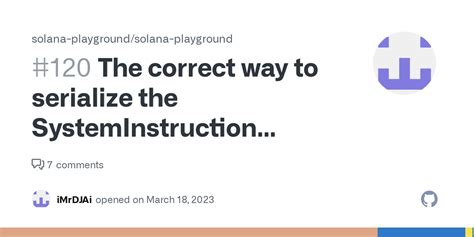Solana: Serializing a transaction with web3.js 2.0
Serializing Transactions on Solana with Web3.js 2.0
Solana provides an efficient and scalable way to interact with its network by leveraging the power of Web3.js, a JavaScript library that enables seamless interaction between your application and the Solana blockchain. When building applications that require interaction with the Solana network, serializing transactions is critical to their secure storage, transmission, and processing.
What is serialization?
Serialization in this context means converting an object (in this case, a transaction) into a format that can be easily stored or transmitted on the blockchain. This process allows for efficient storage and retrieval of transactions, allowing for interaction with the Solana network from different applications.
Converting Web3.js Transaction Objects to Serialized Formats

To serialize transactions on Solana with Web3.js 2.0, you will need to create a Transaction object and then call the serialize() method on it. This will generate a serialized transaction format that can be used for storage or transmission.
Here is an example of how to do this:
const transaction = new Transaction({
// Your Solana account address, sender, recipient, etc.
from: 'Solana-1',
or: 'Solana-2',
data: 42,
});
const serializedTransaction = transaction.serialize();
console.log(serializedTransaction);
In the above example, “transaction” represents a new transaction that can be used for storage or transmission on the Solana server. The serialize() method generates a JSON-like string representing the transaction in the format required by the Solana blockchain.
2.x Equivalent: Serializing a Transaction Using Web3.js 2.0
The equivalent of the 1.x method is achieved using the jsonm library, which simplifies serialization and deserialization of Solana transactions:
const jsonm = require( 'jsonm');
const transaction = new Transaction({
from: 'Solana-1',
or: 'Solana-2',
data: 42,
});
const serializedTransaction = jsonm.serialize(transaction);
console.log(serializedTransaction);
In this example, the jsonm library automatically generates a serialized transaction format that can be easily stored or transferred to Solana.
Conclusion
Serialization is a fundamental aspect of interacting with the Solana blockchain. By leveraging Web3.js 2.0 and its associated libraries, such as jsonm, you can efficiently store, transmit, and process transactions across the network. This simplifies the development process for applications that require working with Solana data.
Use Cases
– Store transaction details securely in a database or storage service.
– Submit transaction data to a web application for processing or display.
– Implement smart contract functionality on the Solana server by serializing and deserializing transactions.
By following these steps, you can easily convert Web3.js transaction objects into serialized formats that can be securely stored, transmitted, and processed across the Solana network.

Leave a Reply
Want to join the discussion?Feel free to contribute!